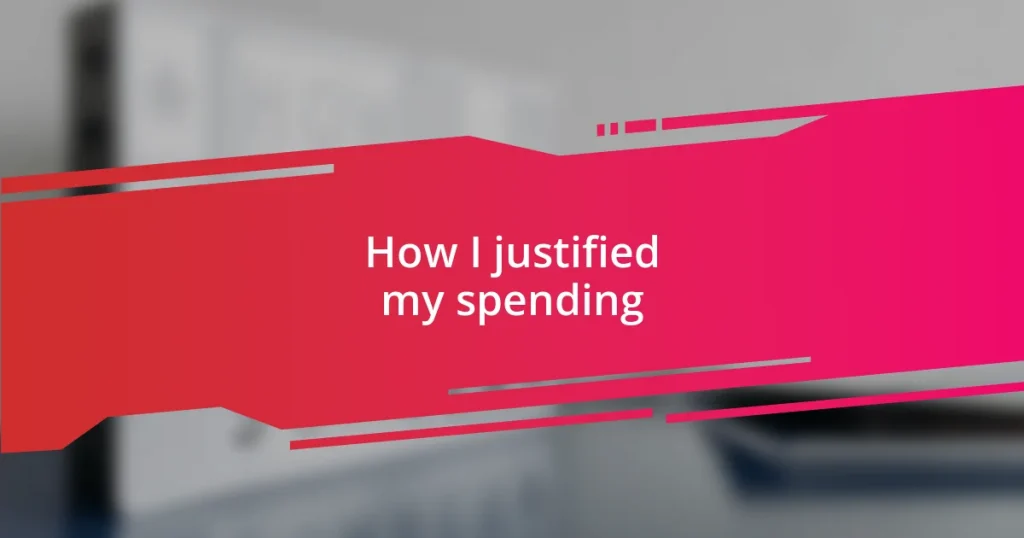Key takeaways:
- Understanding spending habits involves reflecting on emotional influences and tracking purchases to align spending with personal values.
- Setting clear financial goals transforms impulsive spending into strategic investments, aiding in prioritization through visual tools like comparison tables.
- Using budgeting tools and journaling purchases fosters mindful spending, encouraging reflection on whether purchases truly add value over time.
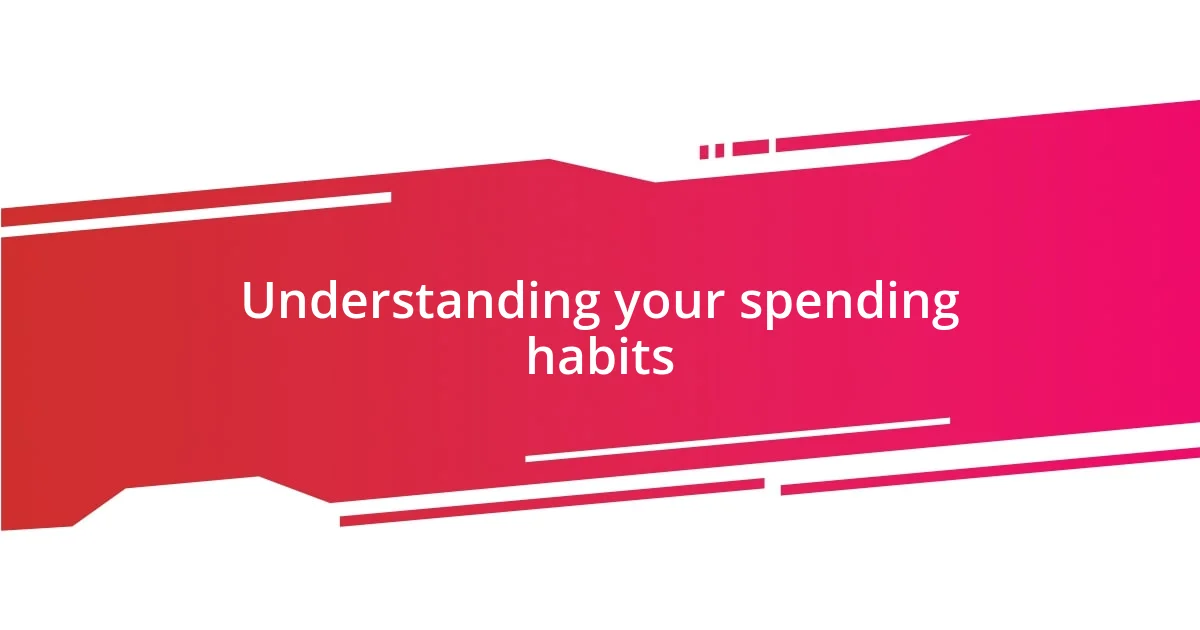
Understanding your spending habits
Understanding your spending habits starts with reflection. I remember when I would buy that fancy coffee every morning, convinced it was my little reward for getting through the day. But then I began to question—was this really a treat, or was it a habit that drained my budget?
Digging deeper, I noticed my spending often mirrored my emotions. After a long week, I would splurge on something unnecessary—justifying it as a “mental health investment.” Have you ever caught yourself doing the same? Recognizing these patterns opened my eyes to how my emotions influenced my decisions, which made me reconsider how I could cope with stress without reaching for my wallet.
Sometimes, it’s just about awareness. For instance, jotting down my purchases helped me see my priorities more clearly. I found that understanding where my money flowed allowed me to reclaim it—redirecting funds towards meaningful experiences rather than fleeting ones. How would you feel if you could regain control over your spending?
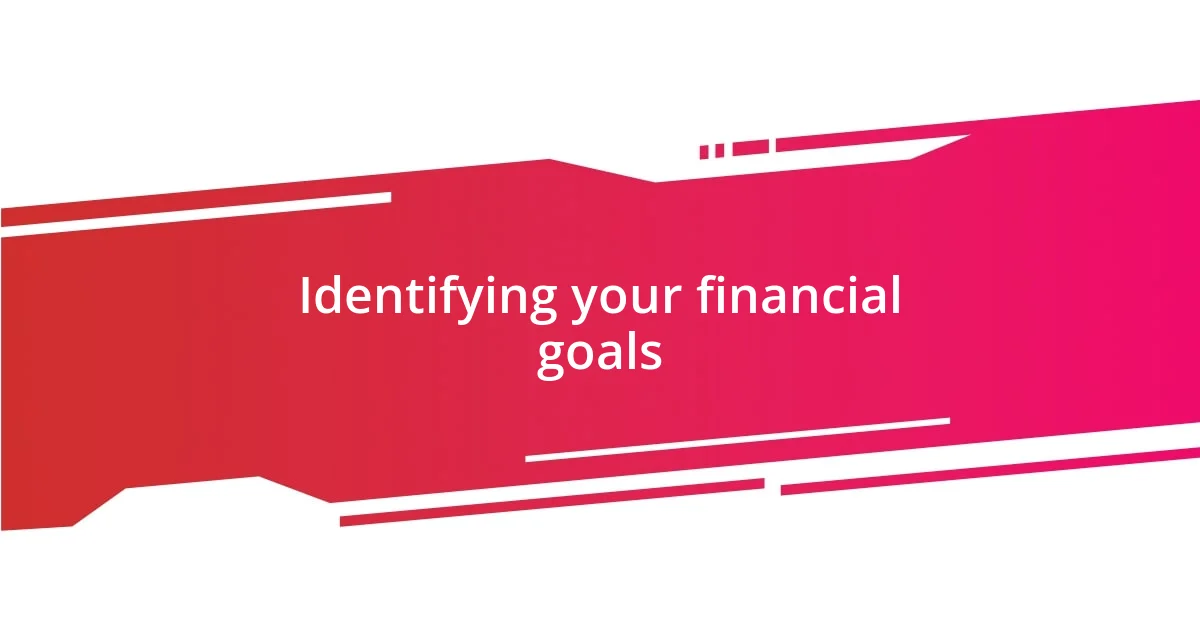
Identifying your financial goals
Identifying financial goals is a crucial exercise for anyone looking to take control of their spending. I vividly recall a period in my life when I had no clear objectives, letting my money wane as whims took the wheel. It wasn’t until I sat down to articulate what I truly wanted—like traveling more or saving for a home—that I could align my spending habits with these aspirations. This simple act suddenly breathed purpose into my finances and transformed my spending from impulse buys to strategic investments towards my dreams.
Taking the time to define your financial goals can feel overwhelming, but it doesn’t have to be. I often break it down into smaller, more digestible chunks. For instance, I started by asking myself, “What do I want to achieve this year?” Maybe it’s saving for a vacation, purchasing a new laptop, or even paying off debt. When I framed my spending through this lens, every purchase became easier to justify—or discard—based on whether it aligned with my goals.
Creating a comparison table of short-term versus long-term goals has been particularly helpful for me. It visually encapsulated my priorities and reminded me of my journey toward achieving them. The clarity this provided was enlightening. Every time I saw that table, it urged me to stay focused and intentional about my spending.
| Short-Term Goals | Long-Term Goals |
|---|---|
| Saving for a vacation | Buying a house |
| Upgrading my phone | Establishing a retirement fund |
| Debt repayment | Investing in stocks |
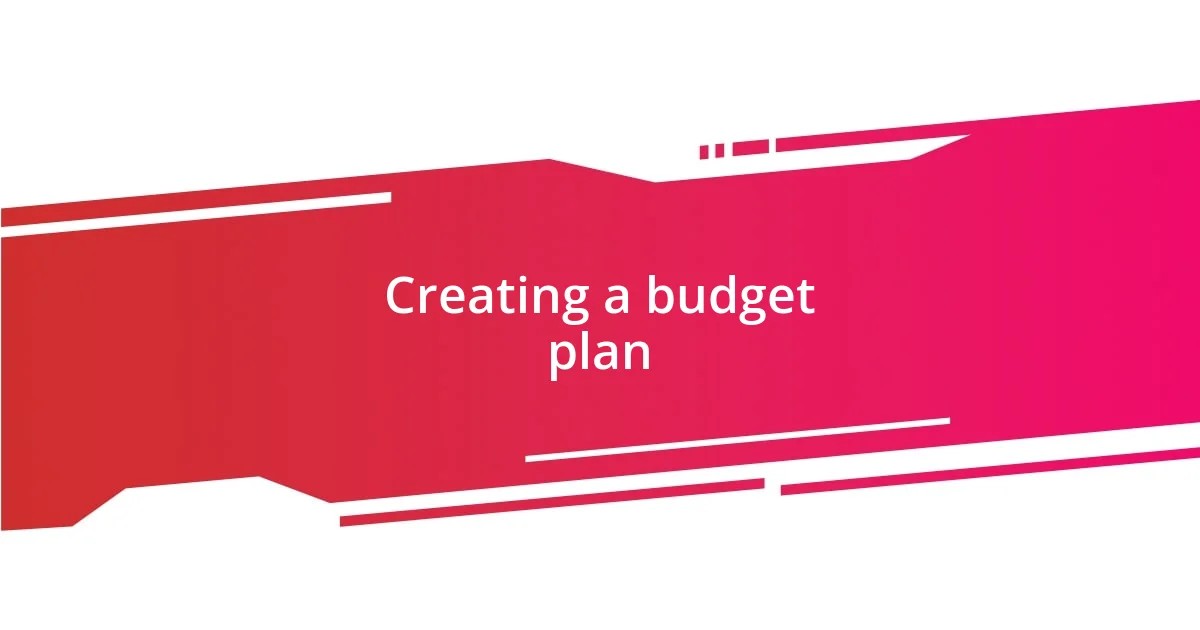
Creating a budget plan
Creating a budget plan is a game changer in managing your finances. I recall when I first sat down to create my own budget; it felt overwhelming. But as I broke it down into manageable categories—like essentials, savings, and discretionary spending—it became a clear roadmap for my financial journey. That moment made me realize budgeting is less about restrictions and more about empowerment.
To make budgeting effective, I found these essential steps helpful:
– List all income sources: Knowing exactly what comes in each month helps set a solid foundation.
– Track your expenses: I keep a simple spreadsheet to record daily spending. It shines a light on unexpected costs.
– Categorize your spending: Grouping costs into necessary and optional categories aids in visualizing where adjustments can be made.
– Set limits for categories: I was surprised to realize I could limit my dining out budget, which allowed me to save for that trip I’d been dreaming about.
– Review regularly: Just as I learned, life changes, and my budget needs to reflect that. Monthly reviews keep me on track and adaptable.
By implementing these steps, I’ve turned budgeting from a daunting task into a regular part of my routine that brings clarity and control to my finances. The relief of not worrying about money is truly freeing.
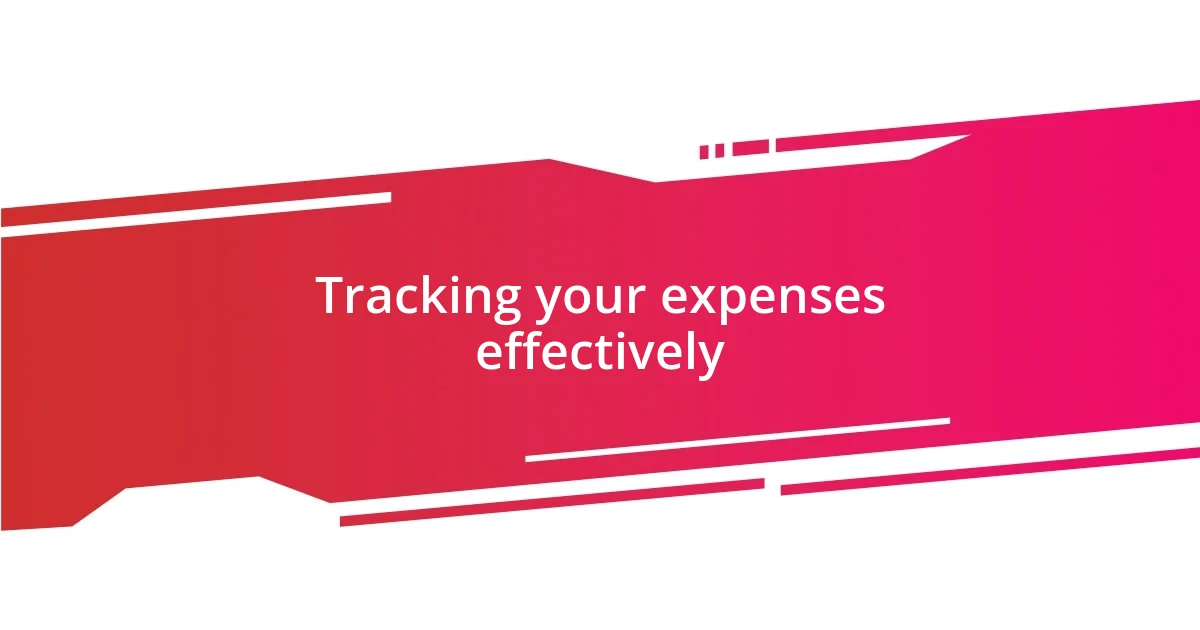
Tracking your expenses effectively
Tracking your expenses effectively is akin to shining a flashlight on the hidden corners of your financial landscape. I remember a time when I thought I was managing my money well, only to discover that small, seemingly harmless daily purchases added up to a hefty sum by month’s end. It was eye-opening! By using an app to log my spending daily, I could see not just how much I was spending, but exactly where that money was flowing.
One method that worked wonders for me was setting aside a specific time each week to review my expenses. I’d usually brew a cup of my favorite tea and get cozy with my notes. This ritual transformed what once felt like a tedious chore into a calming habit that kept me informed about my finances. How often do we take the time to reflect? In doing so, I found that I was not just aware of my spending but could also make necessary adjustments before the month spiraled out of control.
Moreover, I discovered the power of visual aids. Creating charts and graphs helped me grasp my spending habits quickly. It reminded me of the satisfaction I get from crossing off a goal on my to-do list. When I see those colorful visuals reflecting my financial progress, it motivates me to continue on the right path. Have you ever celebrated a small victory in your spending journey? It’s those little successes that keep the momentum going and make tracking expenses feel rewarding rather than burdensome.
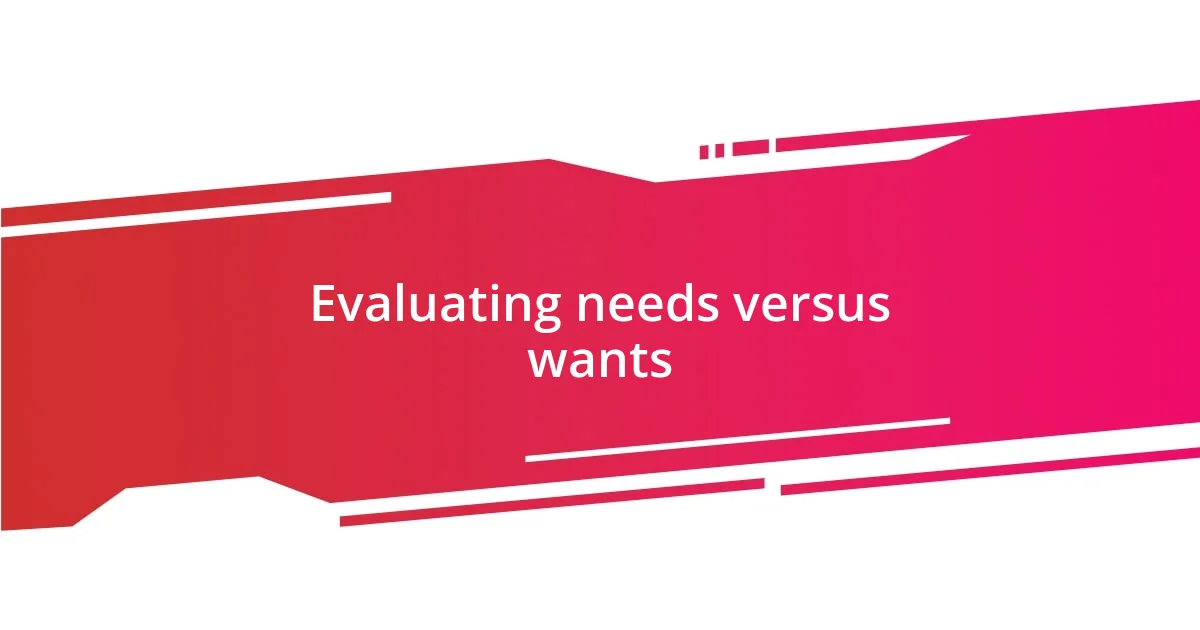
Evaluating needs versus wants
When I first started grappling with my finances, distinguishing between needs and wants was a major turning point. A simple exercise I frequently practiced was making a list: on one side, I’d jot down essentials like rent and groceries, and on the other, things like that trendy gadget I thought I ‘needed.’ Reflecting on this helped me see that many of my wants were just distractions from my true goals. Have you ever caught yourself justifying a purchase that, in hindsight, didn’t add value to your life?
I vividly remember the time I splurged on a subscription box filled with gourmet snacks. At first, I thought, “This is a treat I deserve!” But after a couple of months, I realized it only contributed to my clutter and didn’t enhance my overall happiness. I began to understand that while it’s important to indulge occasionally, I needed to prioritize my financial security over fleeting pleasures. What about you? Have you experienced this kind of realization?
Now, I approach purchases with a more critical eye. I ask myself questions that connect the item to my goals. “Does this align with what I truly value?” I found that taking this step drastically reduced impulse buys. Embracing this clarity has not only streamlined my spending but also fostered a deeper sense of contentment with what I already have. This balancing act between evaluating needs versus wants has truly transformed my relationship with money.
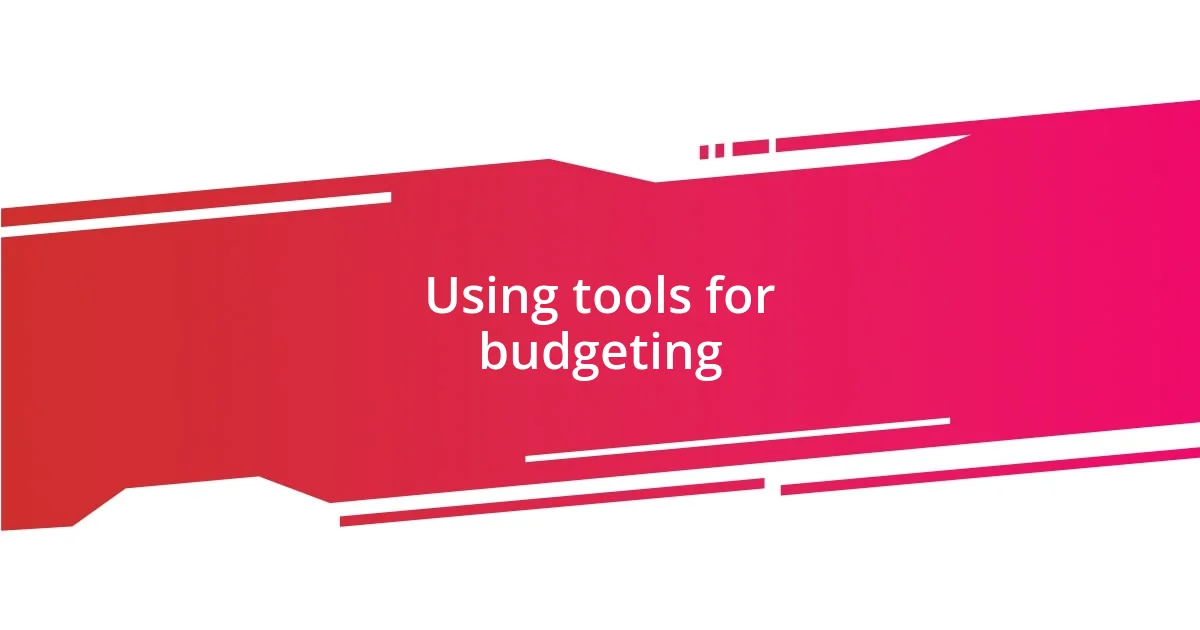
Using tools for budgeting
Using budgeting tools has been a game-changer for me. At first, I relied on simple spreadsheets. However, once I began using dedicated budgeting apps, everything clicked. For instance, when I connected my bank account to one of these apps, I was finally able to view a clear breakdown of my spending categories. Have you ever felt overwhelmed by a mountain of receipts? That instant clarity helped me identify problem areas and adjust my habits accordingly.
One of my favorite features in these apps is the ability to set spending limits for different categories. I remember when I designated a specific amount for dining out each month. It was eye-opening! I loved going out to eat, but I often found myself overspending. With this tool, I could enjoy my meals out while also staying within financial boundaries. Have you felt the tight grip of guilt after overspending? This approach really took the pressure off and made financial planning feel more like a choice rather than a restriction.
Moreover, alerts have been incredibly beneficial for me. I once received a notification that I was nearing my budget limit for entertainment expenses. That little nudge encouraged me to rethink my plans for the weekend. Instead of impulsively going to a concert, I opted for a fun game night at home with friends. Isn’t it funny how small shifts can lead to surprisingly delightful outcomes? Using tools for budgeting has not only empowered my spending choices but also enriched my experiences without breaking the bank.
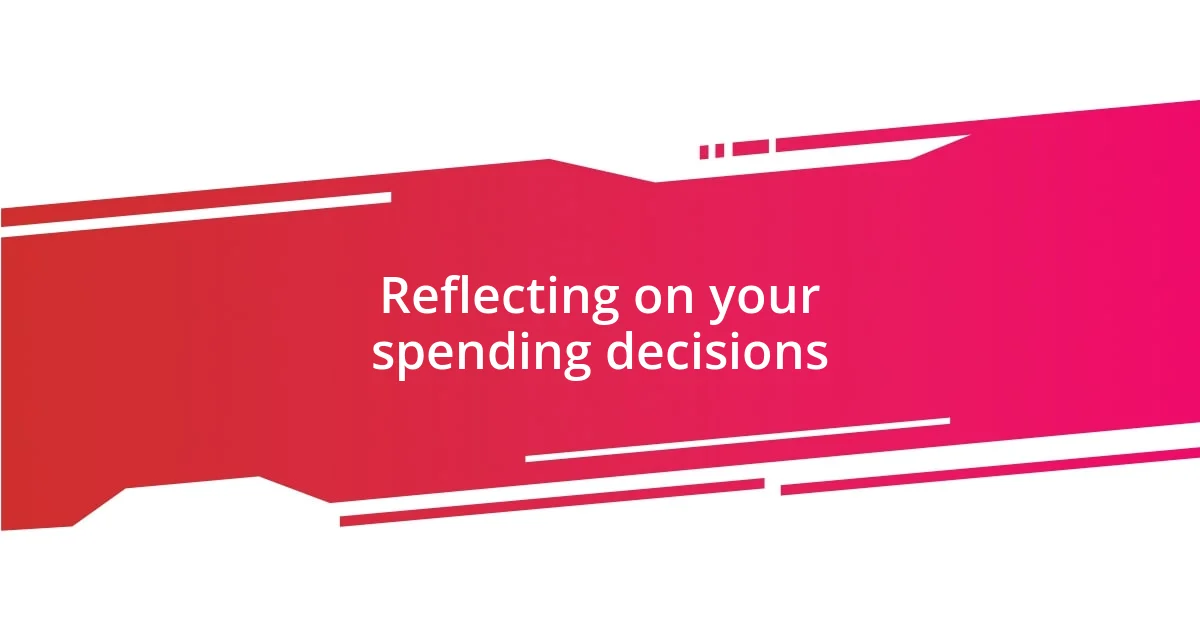
Reflecting on your spending decisions
When I look back on my spending decisions, I often find myself shaking my head at some of the choices I made. There was a time when I felt compelled to buy the latest smartphone right when it launched. I told myself it was a necessary upgrade, yet deep down, I knew I was just chasing the excitement of having something new. Reflecting on that moment taught me how easily I could get swept away by trends rather than focusing on practical needs.
One technique that helped me shift my mindset was journaling my purchases. Once, I recorded a splurge on a fancy coffee maker that I convinced myself would elevate my mornings. While it initially brought joy, over time, I barely used it and it sat collecting dust. That stark realization hit hard; the exhilaration of shopping had overshadowed my actual satisfaction. Have you ever kept a purchase journal? It can be a revealing practice, shedding light on patterns in our spending and guiding you to make decisions with more clarity.
These reflections aren’t just about regret; they’re opportunities for growth. I now take a pause before making any significant purchase, using a mental checklist: “Will this still matter to me in a month?” This simple question has saved me from countless impulsive buys. I wonder if asking yourself similar questions before spending could help you too? It’s fascinating how a moment of reflection can lead to smarter financial habits and greater contentment overall.










